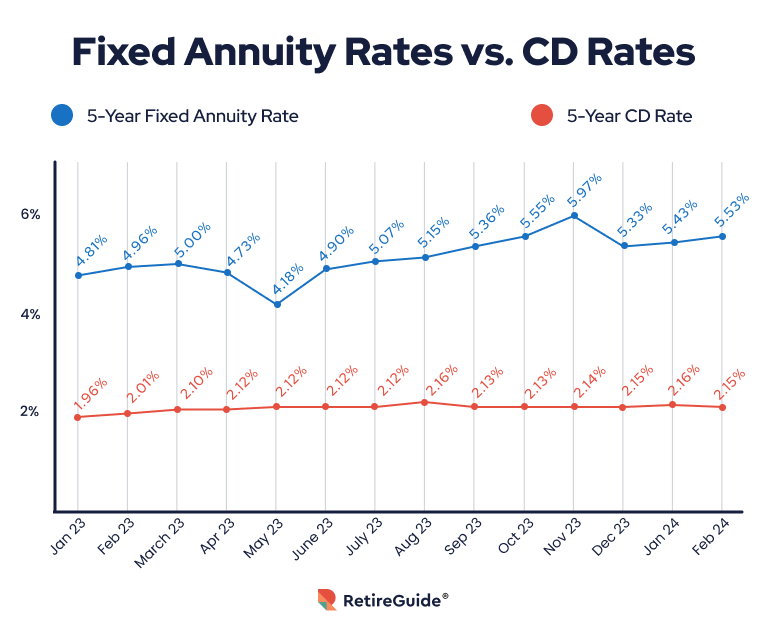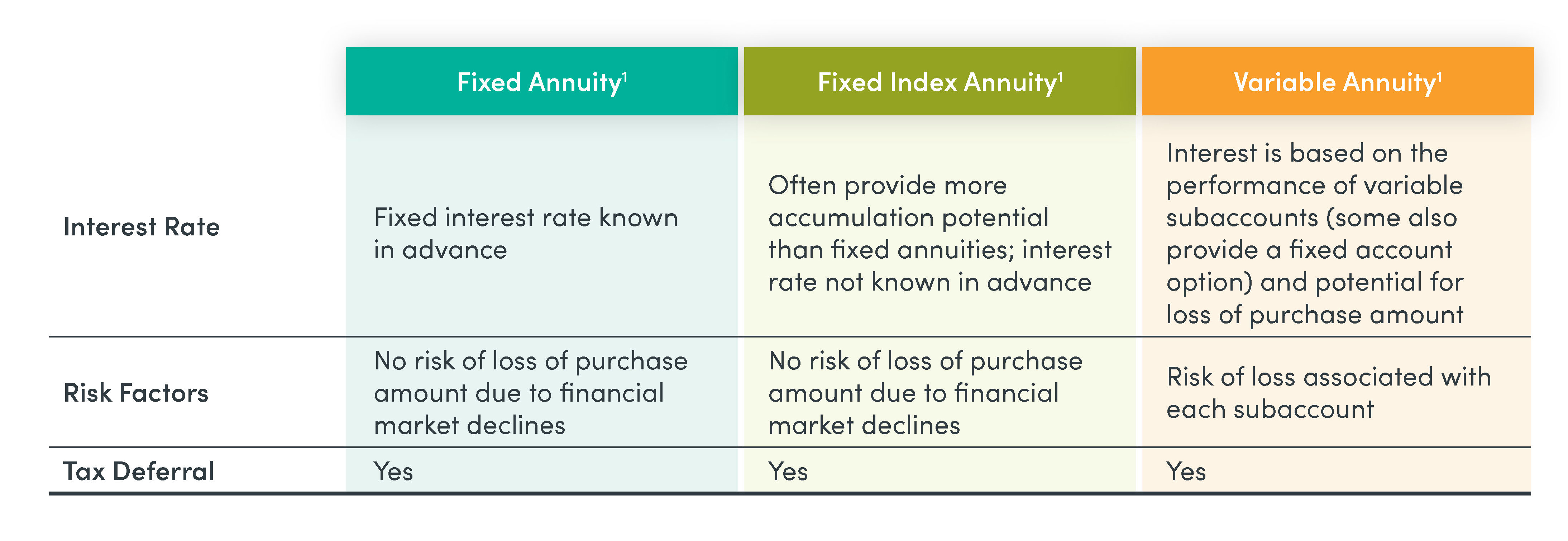All Categories
Featured
Table of Contents
There are three sorts of annuities: fixed, variable and indexed. With a fixed annuity, the insurer assures both the rate of return (the rates of interest) and the payout to the investor. The rate of interest on a dealt with annuity can alter with time. Frequently the rate of interest is repaired for a variety of years and then changes regularly based on existing rates.
With a deferred set annuity, the insurance company concurs to pay you no much less than a specified interest rate during the time that your account is growing. With a prompt set annuityor when you "annuitize" your delayed annuityyou obtain a predetermined set quantity of money, normally on a month-to-month basis (similar to a pension).
While a variable annuity has the benefit of tax-deferred development, its yearly costs are likely to be a lot greater than the expenses of a normal mutual fund. And, unlike a fixed annuity, variable annuities don't supply any kind of warranty that you'll gain a return on your investment. Rather, there's a threat that you might in fact shed cash.
Decoding Fixed Vs Variable Annuities Everything You Need to Know About Financial Strategies What Is Retirement Income Fixed Vs Variable Annuity? Pros and Cons of Fixed Index Annuity Vs Variable Annuity Why Variable Vs Fixed Annuity Can Impact Your Future How to Compare Different Investment Plans: How It Works Key Differences Between Different Financial Strategies Understanding the Rewards of Long-Term Investments Who Should Consider Strategic Financial Planning? Tips for Choosing Variable Vs Fixed Annuity FAQs About Planning Your Financial Future Common Mistakes to Avoid When Choosing Fixed Index Annuity Vs Variable Annuity Financial Planning Simplified: Understanding Your Options A Beginner’s Guide to Smart Investment Decisions A Closer Look at Fixed Income Annuity Vs Variable Annuity
As a result of the complexity of variable annuities, they're a leading resource of financier issues to FINRA. Prior to getting a variable annuity, meticulously read the annuity's program, and ask the individual marketing the annuity to discuss all of the item's attributes, motorcyclists, expenses and constraints. You need to also know just how your broker is being made up, including whether they're receiving a payment and, if so, how much.
Indexed annuities are intricate financial instruments that have features of both taken care of and variable annuities. Indexed annuities typically provide a minimal surefire rate of interest integrated with a rates of interest connected to a market index. Many indexed annuities are connected to wide, widely known indexes like the S&P 500 Index. Yet some usage various other indexes, including those that represent other sectors of the market.
Comprehending the functions of an indexed annuity can be confusing. There are several indexing methods firms utilize to compute gains and, due to the variety and intricacy of the techniques made use of to debt interest, it's tough to contrast one indexed annuity to another. Indexed annuities are usually classified as one of the adhering to two kinds: EIAs offer an ensured minimum rate of interest (commonly at least 87.5 percent of the premium paid at 1 to 3 percent interest), as well as an added passion rate connected to the efficiency of one or even more market index.

Conservative investors who value safety and security and stability. Those nearing retired life who wish to shelter their assets from the volatility of the stock or bond market. With variable annuities, you can spend in a selection of protections including supply and bond funds. Supply market performance figures out the annuity's worth and the return you will get from the cash you invest.
Comfy with fluctuations in the supply market and want your financial investments to maintain rate with rising cost of living over an extended period of time. Young and wish to prepare monetarily for retirement by gaining the gains in the stock or bond market over the long-term.
As you're developing your retirement savings, there are many ways to extend your money. can be particularly useful cost savings tools since they assure a revenue quantity for either a set period of time or for the remainder of your life. Repaired and variable annuities are two options that offer tax-deferred growth on your contributionsthough they do it in various ways.
Understanding What Is A Variable Annuity Vs A Fixed Annuity Everything You Need to Know About Deferred Annuity Vs Variable Annuity Breaking Down the Basics of Investment Plans Benefits of Choosing the Right Financial Plan Why Fixed Interest Annuity Vs Variable Investment Annuity Matters for Retirement Planning How to Compare Different Investment Plans: Simplified Key Differences Between Choosing Between Fixed Annuity And Variable Annuity Understanding the Risks of Annuities Fixed Vs Variable Who Should Consider Retirement Income Fixed Vs Variable Annuity? Tips for Choosing the Best Investment Strategy FAQs About Planning Your Financial Future Common Mistakes to Avoid When Choosing Immediate Fixed Annuity Vs Variable Annuity Financial Planning Simplified: Understanding Variable Annuities Vs Fixed Annuities A Beginner’s Guide to Deferred Annuity Vs Variable Annuity A Closer Look at Variable Annuities Vs Fixed Annuities
variable annuity or both as you plot out your retired life income plan. A gives a guaranteed rate of interest. It's taken into consideration a conventional item, supplying a small profits that are not connected to market performance. Your agreement value will raise as a result of the amassing of ensured passion earnings, suggesting it won't shed worth if the marketplace experiences losses.
Your variable annuity's investment performance will affect the dimension of your nest egg. When you start taking annuity payments, they will certainly depend on the annuity worth at that time.
Market losses likely will lead to smaller payments. Any interest or other gains in either kind of agreement are sheltered from current-year tax; your tax responsibility will come when withdrawals begin. Let's take a look at the core features of these annuities so you can decide exactly how one or both might fit with your overall retired life approach.

A set annuity's worth will certainly not decline due to market lossesit's regular and steady. On the other hand, variable annuity values will certainly vary with the efficiency of the subaccounts you elect as the marketplaces fluctuate. Incomes on your dealt with annuity will highly depend upon its contracted price when acquired.
Alternatively, payment on a repaired annuity bought when passion prices are low are more likely to pay revenues at a lower price. If the rates of interest is guaranteed for the length of the agreement, profits will continue to be continuous regardless of the markets or rate task. A fixed price does not indicate that repaired annuities are risk-free.
While you can not arrive at a fixed rate with a variable annuity, you can choose to buy conservative or aggressive funds customized to your risk degree. Extra conventional investment alternatives, such as temporary mutual fund, can help in reducing volatility in your account. Since fixed annuities use an established rate, dependent upon existing rates of interest, they don't provide that same adaptability.
Exploring What Is Variable Annuity Vs Fixed Annuity A Comprehensive Guide to Tax Benefits Of Fixed Vs Variable Annuities Breaking Down the Basics of Investment Plans Benefits of Choosing the Right Financial Plan Why Choosing the Right Financial Strategy Can Impact Your Future Fixed Interest Annuity Vs Variable Investment Annuity: A Complete Overview Key Differences Between Different Financial Strategies Understanding the Key Features of Variable Vs Fixed Annuities Who Should Consider Fixed Income Annuity Vs Variable Annuity? Tips for Choosing Fixed Interest Annuity Vs Variable Investment Annuity FAQs About Fixed Annuity Vs Variable Annuity Common Mistakes to Avoid When Choosing a Financial Strategy Financial Planning Simplified: Understanding Fixed Annuity Vs Variable Annuity A Beginner’s Guide to Smart Investment Decisions A Closer Look at How to Build a Retirement Plan

Of the its assured development from accrued passion settlements sticks out. Repaired rate of interest use moderate development in exchange for their guaranteed revenues. You possibly could earn more long-term by taking extra danger with a variable annuity, however you might likewise lose cash. While repaired annuity contracts stay clear of market threat, their compromise is much less development potential.
Investing your variable annuity in equity funds will give even more prospective for gains. The fees related to variable annuities might be greater than for various other annuities. Investment choices, survivor benefit, and optional benefit assurances that may expand your properties, also include cost. It's important to evaluate features and linked costs to make certain that you're not spending more than you require to.
The insurance coverage business may enforce surrender fees, and the Internal revenue service might levy a very early withdrawal tax obligation fine. They start at a specific percent and then decrease over time.
Annuity revenues undergo a 10% early withdrawal tax obligation charge if taken prior to you reach age 59 unless an exemption applies. This is enforced by the internal revenue service and puts on all annuities. Both repaired and variable annuities supply choices for annuitizing your equilibrium and turning it into an assured stream of lifetime earnings.
Breaking Down Your Investment Choices Key Insights on Fixed Vs Variable Annuity Pros And Cons What Is the Best Retirement Option? Benefits of Fixed Indexed Annuity Vs Market-variable Annuity Why Choosing the Right Financial Strategy Matters for Retirement Planning Variable Annuity Vs Fixed Annuity: Simplified Key Differences Between Annuity Fixed Vs Variable Understanding the Key Features of Variable Annuity Vs Fixed Indexed Annuity Who Should Consider Fixed Annuity Vs Variable Annuity? Tips for Choosing Fixed Index Annuity Vs Variable Annuities FAQs About Annuity Fixed Vs Variable Common Mistakes to Avoid When Planning Your Retirement Financial Planning Simplified: Understanding Variable Vs Fixed Annuity A Beginner’s Guide to Smart Investment Decisions A Closer Look at How to Build a Retirement Plan
You may choose to use both fixed and variable annuities. If you're choosing one over the various other, the differences matter: A might be a far better option than a variable annuity if you have a more traditional threat resistance and you seek foreseeable interest and primary security. A may be a much better choice if you have a higher threat resistance and want the potential for lasting market-based growth.
There are various types of annuities that are designed to serve different purposes. A set annuity assurances payment of a collection amount for the term of the agreement.
A variable annuity fluctuates based on the returns on the common funds it is bought. Its worth can increase or down. An instant annuity starts paying out as quickly as the purchaser makes a lump-sum payment to the insurance company. A deferred annuity begins payments on a future date established by the customer.
Annuities' returns can be either fixed or variable. With a fixed annuity, the insurance company ensures the purchaser a specific repayment at some future date.
Table of Contents
Latest Posts
Decoding How Investment Plans Work A Closer Look at Fixed Interest Annuity Vs Variable Investment Annuity What Is Variable Vs Fixed Annuities? Advantages and Disadvantages of Fixed Annuity Vs Variable
Breaking Down Fixed Vs Variable Annuity Everything You Need to Know About Financial Strategies What Is Fixed Vs Variable Annuity Pros Cons? Pros and Cons of What Is A Variable Annuity Vs A Fixed Annui
Decoding Choosing Between Fixed Annuity And Variable Annuity Key Insights on Your Financial Future Defining Fixed Income Annuity Vs Variable Annuity Benefits of Fixed Interest Annuity Vs Variable Inve
More
Latest Posts